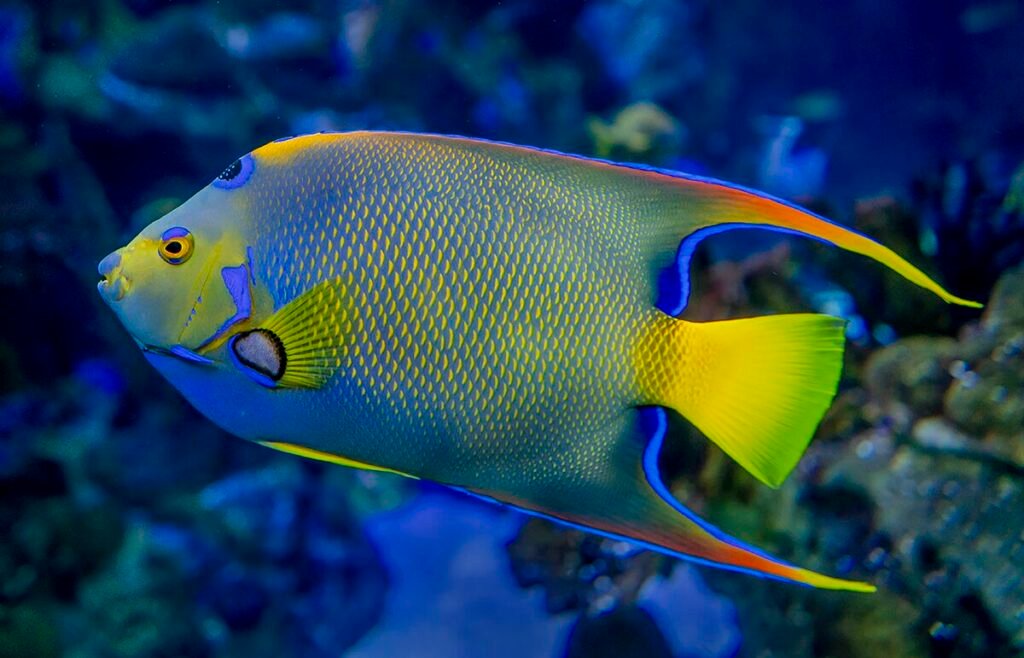The Queen Angelfish, known for its vibrant colors and elegant appearance, is not only a stunning marine creature but also an important subject of study in marine education. Educational programs focused on Queen Angelfish provide valuable insights into marine biology, conservation, and environmental science. These programs engage students and enthusiasts by offering hands-on learning experiences and in-depth knowledge about this fascinating species. Here’s an overview of how educational programs focus on Queen Angelfish and why they are significant.

Educational Programs on Queen Angelfish
Marine Biology Courses
Many marine biology courses incorporate the Queen Angelfish into their curriculum due to its unique biological characteristics and ecological role. These courses often cover topics such as:
- Anatomy and Physiology: Students learn about the physical structure of Queen Angelfish, including its vibrant coloration and adaptive features. Understanding its anatomy helps in comprehending how it interacts with its environment.
- Behavioral Studies: The programs examine the social behaviors and mating practices of Queen Angelfish. These studies provide insights into their complex interactions and reproductive strategies.
Moreover, marine biology courses often include field trips to observe Queen Angelfish in their natural habitat. These excursions offer practical experience and deepen students’ understanding of marine ecosystems.
Conservation Programs
Conservation programs focused on Queen Angelfish aim to raise awareness about the species’ conservation status and the threats it faces. These programs often feature:
- Habitat Preservation: Educational content highlights the importance of protecting coral reefs and other habitats where Queen Angelfish thrive. Participants learn about habitat degradation and the impact on marine life.
- Sustainable Practices: Programs teach about sustainable fishing practices and the responsible aquarium trade. In addition, they emphasize the role of individuals and communities in conservation efforts.
Furthermore, conservation programs may collaborate with local organizations to participate in reef clean-up projects or habitat restoration activities. These hands-on initiatives enable participants to contribute actively to the preservation of Queen Angelfish populations.
Interactive Learning Tools
Interactive learning tools play a crucial role in engaging students and providing a dynamic learning experience. For Queen Angelfish, these tools might include:
- Virtual Aquariums: Virtual simulations allow students to explore the Queen Angelfish’s environment and behavior in an immersive digital setting. This technology provides a realistic view of their natural habitat.
- Educational Games and Apps: Games and apps designed around Queen Angelfish can reinforce learning through interactive challenges and quizzes. These tools make complex concepts more accessible and enjoyable.
To add on, interactive tools often include multimedia resources such as videos and animations that depict the life cycle and ecological role of Queen Angelfish. These resources enhance comprehension and retention of information.
Classroom Projects and Activities
Classroom projects focused on Queen Angelfish offer practical applications of theoretical knowledge. These activities might include:
- Research Projects: Students can conduct research on various aspects of Queen Angelfish, such as their feeding habits, predators, and role in the ecosystem. Presenting their findings helps develop research and presentation skills.
- Art and Science Integration: Combining art and science, students might create models or illustrations of Queen Angelfish. This approach fosters creativity while reinforcing scientific concepts.
Additionally, classroom projects often involve collaboration with marine biologists or conservationists. Guest speakers and virtual interviews provide real-world perspectives and enhance the educational experience.
Documentaries and Educational Media
Documentaries and educational media offer a compelling way to learn about Queen Angelfish. These resources typically include:
- Documentaries: Films and documentaries showcase the life and habitat of Queen Angelfish, providing visual and narrative insights into their world. They often feature expert interviews and field footage.
- Educational Videos: Short educational videos focus on specific topics related to Queen Angelfish, such as their diet or migration patterns. These videos are useful for reinforcing classroom learning.
Thus, educational media serves as an effective tool for reaching a broader audience and generating interest in marine science.
Collaboration with Marine Institutions
Collaborating with marine institutions can enhance educational programs focused on Queen Angelfish. Institutions such as aquariums, research centers, and marine sanctuaries offer:
- Workshops and Seminars: These events provide opportunities for hands-on learning and expert guidance. Participants can engage in practical activities and gain insights from marine scientists.
- Internships and Volunteering: Programs often include internship and volunteering opportunities at marine institutions. These experiences offer valuable exposure to professional marine research and conservation efforts.
Moreover, partnerships with these institutions can facilitate access to specialized resources and expertise, enriching the educational experience.
Public Awareness and Outreach
Educational programs also focus on raising public awareness about Queen Angelfish and their importance. Outreach activities might include:
- Public Talks and Exhibitions: Organizing talks and exhibitions about Queen Angelfish helps educate the general public and foster a greater appreciation for marine life.
- Community Engagement: Programs often involve community events and campaigns to promote marine conservation and responsible behavior.
Conclusion
In conclusion, educational programs focused on Queen Angelfish provide a comprehensive understanding of this remarkable species. From marine biology courses and conservation efforts to interactive learning tools and public outreach, these programs offer valuable opportunities for learning and engagement. By participating in these educational initiatives, students and enthusiasts can contribute to the preservation and appreciation of Queen Angelfish and their marine environments.




